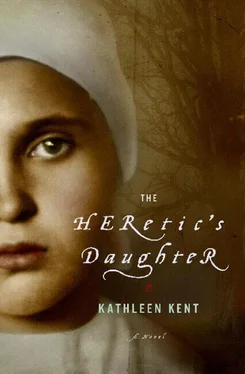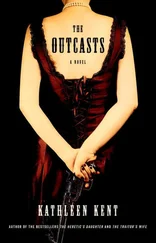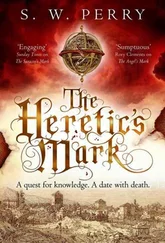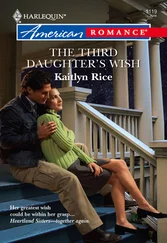A woman crept her way slowly towards Tom and me, her dress dirty and worn and rust-stained from the chains that rested against her apron, and said softly, “Children, come sit with me. You are in the good cell. Not the other one. Come and find a place with me and rest easy.” Her face was very kind and her hands gentle as they found my resisting fingers. I looked around at the women, unbathed, unfed, and all of them manacled, even the youngest of them, and wondered what she could mean by the “good” cell. I did not know that most of the women in the far cell were condemned to die and that my mother had found fellowship with fifteen other martyrs in a cell made to hold six or seven.
We sat with the kind woman for a few hours, until the blacksmith came and fitted us with manacles, manacles that Father would have to repay the sheriff for. The man was curt and brusque but he knew his craft and did not miss his mark when the hammer came down for the final closure. Many an arm or ankle could be shattered with a careless blow. Some of the women, the women who had been longest in the prison, had their chains passed through a ring bolt attached to the floor or the wall, but because we were so young, our chains were left free. Soon after came the time for the sheriff to let into the corridor, one by one, the families of the imprisoned to pass food or clothing through the bars. The time spent in the corridor was only as long as the number of coins or barter that could be slipped into the hands of the jailer. Most everyone had no coins and so were given only a few moments for comfort or prayers or for saying good-bye.
The doors to the cells were rarely opened for visitors, except for a minister or the few attending doctors who came out of charity. Or to remove the body of someone who had died during the night. It was late afternoon before Tom and I saw the corridor darken from the shadow of our father’s crouching figure appearing at the bars to our cell. The ceiling was no more than six feet high, three feet down into the rocky ground, making a half cellar, and three feet built up with a stone foundation for the house resting above the cells.
He wrapped his hands around the bars and called to us. When he saw we were manacled he bowed his head and said, “Dear God…,” but there was no time to linger, for he had to deliver food to Richard, Andrew, and Mother before he was forced to leave. He handed me a small loaf of bread, a leather water skin, a shawl for me, and a coat for Tom, and said hurriedly, “Sarah, listen to what I say. Drink what’s in the skin first and only from the open barrel when you must. This bread must last awhile. If you chew it long it will seem to be more. I will try to bring meat when next I come, but it may not be for days yet. So you must harken to me.” He reached through the bars and pulled me closer to him and said, “Do not share this bread with anyone but Tom. There are women here who are starving and who will beg from you, but you will sicken and die if you do not do as I say. D’ye hear me, Sarah?”
I nodded, tucking the bread into my apron, and he said to Tom, “Tom, remember what I told you that day? After you threw down the harness in the field. Remember?” When Tom nodded, Father said, “It’s to you now. I will return when I can.”
He started up to leave, but, remembering my sister, I called out to him, “Where’s Hannah?” He ducked his head for a moment and answered, “She is with the Reverend Dane’s family. They will take good care of her.” The Reverend’s wife was a kind woman, but austere, and I wondered what she would make of Hannah, only three years old, wild, unclean, with an endless need for attention. For many months I had been mother to her and now she was torn away from yet another family. For all the times I had been unkind to her or impatient or cruel, I wept.
Father crossed the corridor to give Richard, Andrew, and finally Mother some small bit of food. When Mother’s hands came through the bars, he pressed her knuckles to his eyes and said some soft words to her. Then the sheriff called down, and when Father left us, the afternoon had dimmed towards dusk. Our cell, our “good” cell, faced west, and the light of the setting sun flashed briefly through the high slits in the walls, turning our skin red and yellow, as though the straw had been set aflame and was burning us all alive in our prison.
IT TOOK ONLY a few hours for the vermin to find their way into my hair, and I woke in the night with my scalp on fire. I started scratching and tearing at it with my nails, feeling the tickling on my skin as the lice danced around my fingers. A woman somewhere on the opposite wall had started an agonized moaning, and with every breath she said, “Oh my God, my tooth. Oh my God, my tooth…” She continued her wailing even when she was accosted with pleas for silence, and some violent curses as well. The night had turned cold and I wrapped the shawl more tightly around me. I turned to look at Tom but the rhythms of his breathing told me he was yet deep in sleep. The haggard crying continued for an hour or so until another woman tipped a flask of some liquid into the moaning woman’s mouth. Soon her noises quieted into whimpering and she drifted off into oblivion.
I could hear tiny rustlings all through the straw and once saw the shine of a pair of dark, liquid eyes set narrowly over a pointed snout. He watched me, sniffing at the loaf of bread hidden in my apron. I kicked out at him and he crept deeper into the straw but did not move away. I kicked at him more forcefully and he melted into the darker rushes below the straw. I dozed fitfully until the murky light from the morning filled the cell enough to see more clearly the features of the women surrounding me on all sides. One by one they opened their eyes, some to pain, some to desperation, some to prayers for deliverance or acceptance, but all of them to the renewed horror of their confinement. And in common to all of these wives and mothers and sisters who had worked and prayed and midwifed in good faith with their neighbors was the searching, confused gaze that they should be accused and imprisoned and seemingly forgotten by those same neighbors.
There were some so slatternly that they rolled over to the slop buckets, scratching and rubbing themselves without any attention to their dress, or their modesty, and took no time in straightening their aprons, lacing their bodices, or turning their stockings. But most tried to clean themselves, wiping their faces with their sleeves, or polishing their teeth with the edge of their aprons, in a way that was in equal parts noble and sad. And they shared whatever they had. A shattered comb was passed around as delicately and as solemnly as a holy relic. Some bit of ointment was given to whoever had wounds beneath her manacles. Many an undershift had been torn into pieces to bind open wounds. There was no lamb’s wool or soft leather strips for the women of childbearing years who had their monthly courses, and many of the girls walked in shame with their skirts pleated together, held in folds at their backs, hiding the brackish stains.
And then there came the time when one woman went around asking for some share of food to be given to those women who had no family or had family too poor to come every day, or every few days, to pass through the bars even the smallest measure of bread. The woman’s name was Dorcas Hoar and she had been arrested in Beverly and brought to the prison in April. She was old and walked with a rolling limp but carried herself with dignity, and when she came to Tom and me, her eyes were filled with compassion. But when she held out her hand, I dropped my eyes and said that we had nothing to give. I felt her eyes on me, and the blood rushed to my face with the lie. She reached down and placed her hand on my head and said, “God bless you and keep you, child.” And then she moved to the next woman and the next and the next until she had a few crumbs to share.
Читать дальше












